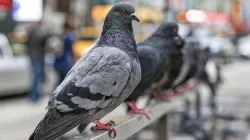Case study highlights hidden health risks of prolonged exposure to pigeons
A boy with pigeon allergy develops life-threatening lung disease. Early diagnosis and treatment prevent serious complications. Doctors urge caution around birds.

The recent report of a young boy encountering life-threatening allergic reactions after extended exposure to pigeon feathers and waste highlights the serious health dangers associated with prolonged contact with these birds. The 11-year-old from east Delhi was taken to Sir Ganga Ram Hospital with symptoms that appeared to be a common cough, as revealed in the study conducted by doctors.
As his breathing got worse, his condition deteriorated, according to a statement. The youngster was found to have Hypersensitivity Pneumonitis (HP) due to an allergic response to pigeon proteins, necessitating urgent medical intervention, stated Dr Dhiren Gupta, Co-Director of the Pediatric Intensive Care Unit (PICU).
According to him, medical examinations revealed lung inflammation and opacities that are indicative of HP. Opacities are areas on a chest X-ray that appear white when they should be darker. Gupta clarified that HP is a long-term lung disease that causes scarring in the lungs, making breathing challenging. This condition is more prevalent among adults and uncommon in children, with an incidence of 2-4 cases per 100,000 individuals per year.
The young male received steroid treatment and was given breathing assistance through high-flow oxygen therapy, where the gas was delivered into the body via a tube inserted in the nostrils. This approach reduced lung inflammation and improved his breathing to almost normal levels, as stated by the doctor in the study.
Seeing the boy responding positively to treatment, he was eventually discharged with a comprehensive care plan to manage his condition, Gupta said.
Repeated exposure to environmental substances like bird allergens, moulds, and fungi can lead to inflammation, which is the key feature of respiratory conditions such as HP. Additionally, Dr. Gupta mentioned to PTI that exposure to second-hand e-cigarette vapours may also trigger an inflammatory response.
The case highlights hidden health risks posed by long-term exposure to birds and the critical importance of recognising the early signs of HP. Taking prompt action can prevent serious complications, Gupta said.
"Education about potential environmental triggers, like bird droppings and feathers, is essential for preventing similar incidents," he said. He also emphasised the need to exercise caution while dealing with seemingly harmless pigeons and chickens.
(with PTI inputs)
ALSO READ: Study finds two-way causal links between poverty, mental illnesses